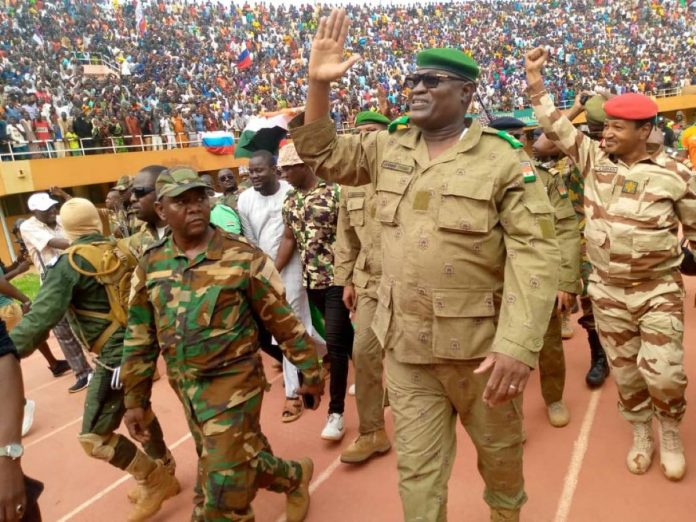By Our Correspondent
NEW DELHI – Niger, the largest Muslim country in West Africa, has been brought to the brink of anarchy following a coup by soldiers in which President Mohamed Bazoum was toppled on July 26.
While the West African countries have imposed sanctions on Niger’s new military rulers after the coup, the coup leaders have warned against any foreign attempts to extract Bazoum and accused former colonial ruler France of plotting a military intervention.
The soldiers who led the coup have blamed insecurity, declining economy and poor governance as reasons to depose the government.
Bazoum, 63, was elected President two years ago in the Niger’s first peaceful, democratic transfer of power since its independence from France in 1960. His ouster has been perceived as a blow against political stability in the nascent democracy. It is likely to adversely affect the efforts to counter fast-spreading insurgency in the Sahel region.
Bazoum, who became President in 2021, was a symbol of democratic order in an otherwise tumultuous coup-ridden region. He had built strong security partnerships with the U.S. and France, which have troops based in Niger. But pressure was also building on Bazoum, as his rule was struggling to meet people’s expectations.
Sections of the military were frustrated with the spread of insurgency in the south and unhappy with his over-reliance on France. The President had also taken steps to curtail the military’s influence, as he forced some generals into retirement, sent others abroad and cut back on the perks given to the Presidential Guard.
The public was also growing weary of the administration amid rising terror attacks and a cost of living crisis. The Presidential Guard exploited this public resentment when it moved in to oust the President citing what they termed as the deteriorating security situation and bad social and economic governance.
The U.S. and France see Niger as a bulwark against insurgency in the region. Al Qaeda, the Islamic State and several other groups operate in the Sahel region, with Niger, Burkina Faso and Mali particularly hit. In Mali and Burkina Faso, which saw coups in 2021 and 2022, the rebellions ousted U.N. peacekeepers and French troops, and moved to build closer security ties with Wagner, Russia’s notorious military company.
In Niger, supporters of the coup staged demonstrations in the capital Niamey, holding Russian flags and demanding the ouster of French troops.
The long French presence and the lack of results in the West’s fight against terrorism seem to have added to the resentment among the militaries and people in the affected countries, which power-hungry generals with a disregard for democratic practices have exploited to seize power.
France and the Economic Community of West African States (Ecowas), a regional grouping, have issued an ultimatum to the coup leaders to restore President Bazoum. But a military intervention will further destabilise the country, helping the insurgents exploit the chaos.
The U.S. and France, which still have influence in Niger, have been advised by international observers to push for talks between the generals and the presidency, seeking an amicable settlement of the disputes and the restoration of democracy.
The coup has clearly pitted Niger’s former Western allies and regional bodies against other countries in the region. The commander of the Presidential Guard, Gen. Abdourahmane Tchiani, has declared himself as the leader of Niger in a televised address. The U.N. suspended its humanitarian operations in Niger and aid was halted, with Britain announcing that it was ceasing all long-term development assistance.
Tchiani and his group have not been recognised internationally by any country as the lawful leaders of Niger. The Ecowas has been unequivocal in its response to the coup. Not only has it suspended ties with Niger and agreed to immediate financial sanctions, it has also authorised the possible use of force if Bazoum is not released and reinstated within a week.
The new leadership has been welcomed in some quarters of Niger, with thousands marching through the streets of the capital to denounce France’s involvement in their country, chanting Vladimir Putin’s name and waving large Russian flags. The demonstrators converged on the French Embassy, throwing stones at the building and setting fire to its doors. The images were troubling to western powers, especially as the Wagner group has a growing presence in the Sahel region.
U.S. President Joe Biden has called for immediate release of Bazoum and his family, and for the country’s democracy to be preserved. “In this critical moment, the United States stands with the people of Niger to honour our decades-long partnership rooted in shared democratic values and support for civilian-led governance,” he said. Biden said the Nigerien people had the right to choose their leaders and their will expressed through free and fair elections must be respected.
As the seven-day ultimatum given by West African leaders for the military in Niger to reinstate Bazoum draws to a close, both sides have crucial decisions to make. A peaceful solution is preferable for all sides, but Ecowas is keen to show its resolve as it has failed to prevent a spate of coups in the region in the last three years.
Niger’s military junta has reportedly asked for help from Wagner, as the deadline nears for it to release Bazoum or face a possible military intervention by the West African regional bloc. The request came during a visit by a coup leader, Gen. Salifou Mody, to neighbouring Mali, where he made contact with someone from Wagner.
It remains to be seen how the international community will react if Wagner comes in. When Wagner came into Mali at the end of 2021, the French military was ousted soon afterward after years of partnership. Wagner was later designated a terrorist organisation by the U.S. The people in Niger are trying to cope with travel and economic sanctions imposed by Ecowas, even as the land and air borders with these countries have been closed and all commercial and financial transactions with them have been suspended.





